
The African Clean Cities Platform (ACCP) was established in April 2017. Participating African countries and partner agencies came together to begin activities for sharing knowledge on waste management, promoting public and private partnership and financial investment, and working towards sustainable development goals (SDGs).
In January 2018, administrative officials in charge of waste management from five countries visited Japan and participated in training to learn about municipal waste management in Japan.
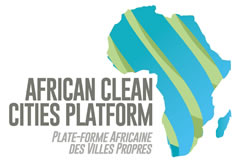
Launching a platform geared towards solving waste problems
Cities in Africa are facing an increasingly serious waste problem as their economies grow and urban populations increase. Improvement of the living environment is essential to continue sustainable growth. With this as background, at a side event held at the Sixth Tokyo International Conference on African Development (TICAD VI) in Nairobi, Kenya in August 2016, participants came to a consensus on the necessity of creating a framework for solving the waste problem; subsequently, a preparatory meeting was held in Mozambique in April 2017 to establish a platform for this task. Japan's Ministry of the Environment, JICA, the City of Yokohama, the United Nations Environment Programme, and the United Nations Human Settlements Programme proposed the establishment of the African Clean Cities Platform (ACCP), and the Maputo Declaration was adopted to endorse the establishment.

As of September 2018, there are now 34 countries participating in the ACCP. In June of this year, administrative officials in charge of waste management from national governments and major cities gathered for the first annual meeting in the Moroccan capital, Rabat. In addition, a training program dedicated to the ACCP was launched to disseminate knowledge and to improve practical waste management skills. Activities for sharing information among participating countries are now in full swing.
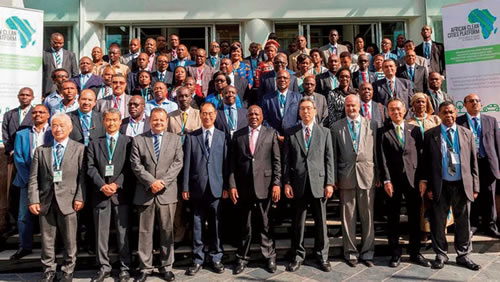
The African Clean Cities Platform was established in Maputo, the capital of Mozambique. Attendees of the preparatory meeting included ministers and heads of local governments from participating countries, including State Minister of the Environment Tadahiko Ito from Japan.
Learning Japanese practices in municipal waste management; attending a training program in Japan
As part of the activities of the ACCP, administrative officials in charge of waste management from Ivory Coast, Lesotho, Nigeria, South Sudan, and Sudan visited Japan from January to February 2018 to learn about municipal waste management.
They observed the flow of waste treatment in Yokohama City, Kanagawa. They expressed keen interest in how different kinds of waste are collected on different days of the week, and how workers collect garbage that has been set out by 8 a.m., which is a sight familiar to Japanese people. They also realized the necessity of raising public awareness of waste collection in their own countries, and the importance of communication between citizens and the government. The group also visited Shibushi City, Kagoshima to see how the municipality reduces waste through a comprehensive sorted collection of waste. They showed a strong interest in ways to reduce waste that would be also applicable to the challenges they face in their own countries, wherein waste is generally sent to landfills without any treatment.
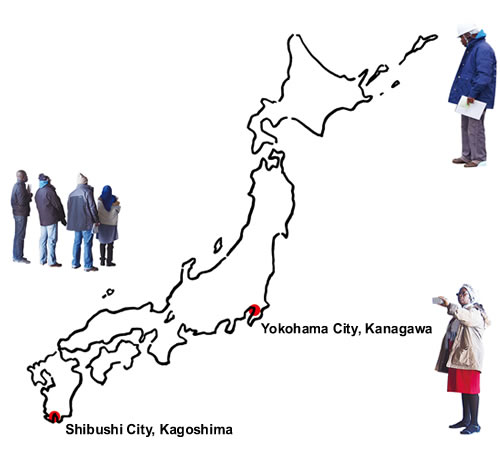
Yokohama City, Kanagawa
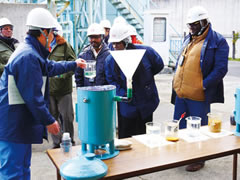
Tour of the wastewater treatment facility for leachate from the Shinmeidai disposal site in Izumi-ku where the landfill site has already closed
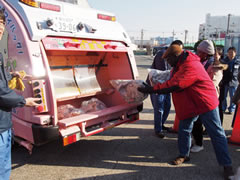
Survey of a residential waste collection point in Kanagawa-ku where the group was highly impressed with the discipline of residents to follow the rules for garbage disposal. They also performed a mock collection of waste.
Shibushi City, Kagoshima
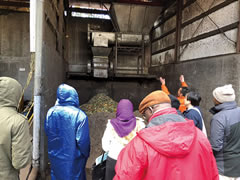
Tour of the household waste composting facility at So Recycling Centerfs Matsuyama Organic Factory in Shibushi City
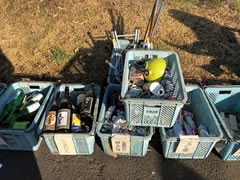
Garbage put out to the collection point by citizens. The focus is on recycling, and the waste is thoroughly sorted because there is no waste incinerator available.




scroll